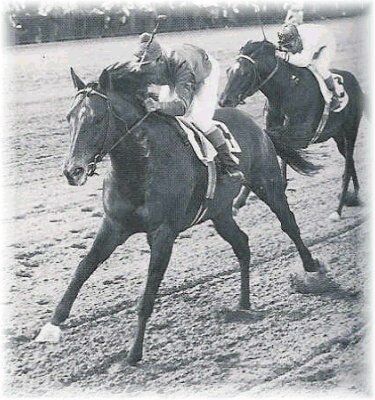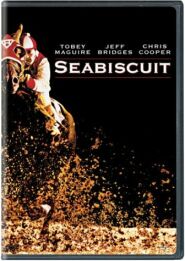

The Belair Stud in Maryland was the home of many champions, including Triple Crown winners Gallant Fox and Omaha. When Nashua was foaled in 1952, William Woodward, Sr., owner of the great stable, planned to run him in the 1955 Epsom Derby. However, he passed away in 1953, and his son William Woodward, Jr. took over the stables. The Belair horses ceased to race on foreign soil.
Nashua's sire was the notorious Nasrullah. A champion at two in England, Nasrullah might very well have won the Epsom Derby at three if he had bothered to try. Known for being lazy and sometimes unpredictable, Nasrullah often required creative motivation during his morning works, and many of his sons shared the trait. Tempermental or not, he was an extremely talented son of the undefeated champion Nearco, and he led the sire's list five times in America. Nashua's dam, Segula, was a daughter of Johnstown, the Kentucky Derby and Belmont Stakes winner of 1939.
Nashua was trained by the great Sunny Jim Fitzsimmons, who had began his career as a horseman at Sheepshead Bay in 1885, and had trained one hundred and forty eight stakes winners. For the Phipps family, he trained 1957 Horse of the Year Bold Ruler, 1929 Handicap Champion Diavolo, 1955 Champion Three Year Old Filly Misty Morn, and Busanda, who won the 1951 Suburban Handicap and as a broodmare produced Buckpasser. Training for Belair Stud, Sunny Jim trained the father-son Triple Crown winners Gallant Fox and Omaha, as well as 1936 Horse of the Year Granville, 1939 Kentucky Derby and Belmont Stakes winner Johnstown, 1932 Belmont Stakes winner Faireno, and the champion fillies Happy Gal and Vagrancy. Captain Alcock, Dark Secret, and Hitting Away were also conditioned by the remarkable Mr. Fitz.
Nashua made his debut on May 5, 1954 at Belmont Park, galloping away from a field of maidens to win by three lengths. Eddie Arcaro rode him for the first time in his next start, when he beat Summer Tan by a half length in the Juvenile Stakes.
The next time out, Nashua's uncooperative nature got the better of him. Fighting rider J. Higley the entire trip, he wound up second, beaten a neck by the better behaved Royal Note.
Eddie Arcaro was back in the saddle for the Grand Union Hotel Stakes, and the results were better. Nashua was the winner by a length and three-quarters while conceding weight to the runner up.
The Hopeful Stakes was next, and Nashua held off a fast closing Summer Tan to win by a neck. The next time out, he sulked after suffering interference, running second to Summer Tan in the Cowdin Stakes.
After beating Royal Coinage by a length and covering six furlongs in 1:08 1/5, Nashua met Summer Tan one more time, in the Futurity. The two battled down the stretch, with Nashua finally winning by a head. Royal Coinage was third.
Never finishing worse than second, Nashua earned $192,865 as a juvenile. Voted Juvenile Champion, Nashua was denied complete domination of his division by Cowdin Stakes winner Summer Tan, who received the honor of high weight on the Experimental Free Handicap, one pound above the champion.
Returning at three, Nashua wintered in Florida, taking that states two biggest three-year-old stakes, the Flamingo Stakes and the Florida Derby. He then headed to Aqueduct for the Wood Memorial. Meeting Summer Tan, Nashua came from behind to beat the Experimental Free Highweight in the final yards. These three triumphs installed Nashua as the favorite for the Kentucky Derby. Second choice in the betting was Santa Anita Derby winner Swaps, a grandson of Hyperion.

Nashua's brave stretch drive at Churchill Downs could not catch the California bred front runner, but he did establish six lengths of daylight between himself and Summer Tan. When Swaps returned to California, Nashua headed for Pimlico for the second of the American classics.
In the Preakness, Nashua carried the Belair silks to a new stakes record of 1:54 3/5. His nine length triumph over Blazing Count in the Belmont Stakes three weeks later was remembered as one of his finest performances.
Next came a five length score in the Dwyer Stakes, followed by a tough fight with Traffic Judge in the Arlington Classic, in which Nashua prevailed by a half length. A match was arranged with Kentucky Derby winner Swaps, to be run at Washington Park in Chicago. While Swaps trained over the fast Chicago surface, Nashua worked at Saratoga. The Upstate New York track had deeper footing, and trainer Sunny Jim felt that this was to Nashua's advantage:
"Training in Saratoga make a horse fit. In a match race the object is to run from the gate, and the fittest horse wins."
Unfortunately, Swaps was not at his best for the much anticipated meeting, worth $100,000 to the winner, and Nashua beat him by six lengths. The two champions never met again, but their two-race rivalry is one of the most famous in American racing history.
After the match, Nashua ran the poorest race of his career in the Sysonby Mile, finishing third behind 1954 Belmont Stakes winner High Gun and Busher's son Jet Action. He quickly made up for the loss with a five length triumph in the Jockey Club Gold Cup, setting a new record for his single season earnings of $752,550 and receiving Horse of the Year honors.
Shortly after Nashua's smashing victory in the Jockey Club Gold Cup, William Woodward, Jr. was accidentally shot and killed by his wife. The resulting scandal made headlines, and resulted in a fictional account by Dominick Dunne thirty years later.
Nashua was auctioned by sealed bid, and Leslie Combs II of Spendthrift Farm paid $1,251,200 as the head of a syndicate. The purchase made Nashua the first million dollar racehorse.
The million dollar son of Nasrullah returned to the track in 1956, drawing a record crowd of 42,000 to watch him beat Social Outcast, who had been coupled with Native Dancer for the 1953 Kentucky Derby, was well as Toboggan Handicap winner Sailor and Excelsior Handicap winner Find, in the Widener Handicap at Hialeah. With the triumph, Nashua became the second horse to pass the million dollar mark in earnings.
Nashua ran out of the money for the first time in his career in the Gulfstream Park Handicap, running wide the entire trip and tiring behind Sailor. He made up for it the next time out. Despite the fact that he nearly went down at the break, Nashua beat Find by a head while giving him ten pounds in the Grey Lag Handicap.
His two length win in the Camden Handicap sent Nashua past Citation in earnings, making him the world's leading money winner.
Nashua ran out of ground in the one mile Metropolitan Handicap, then ran out of the money in the seven furlong Carter Handicap. Back at a more comfortable distance, he won the Suburban Handicap by a length and a quarter.
Carrying 129 pounds, Nashua cruised to victory in the Monmouth Handicap, winning by three and a half lengths. He then failed to run his race in the Woodward Stakes, an event named for his breeder, finishing two and a half lengths behind Mister Gus.
In the final effort of his career, Nashua won the Jockey Club Gold Cup in a new American record time of 3:20 2/5. He retired with twenty-two wins and $1,288,565 in earnings.
As a stallion, Nashua proved worth his syndication price, siring seventy-seven stakes winners, including the champion mare Shuvee, Mr. Prospector's dam Gold Digger, Bramalea, Diplomat Way, Good Manners, and 1981 Marlboro Cup winner Noble Nashua. His daughters produced 122 stakes winners, including the champion Roberto.
Nashua passed away in 1982, and is buried at Spendthrift Farm. He entered the Hall of Fame in 1965, and was included when Blood-Horse printed a list of the centuries best racehorses.
| Year | Starts | Wins | Seconds | Thirds | Earnings |
|---|---|---|---|---|---|
| Lifetime | 30 | 22 | 4 | 1 | $1,288,565 |
| Nasrullah | Nearco | Pharos | Phalaris |
| Scapa Flow | |||
| Nogara | Havresac II | ||
| Catnip | |||
| Mumtaz Begum | Blenheim II | Blandford | |
| Malva | |||
| Mumtaz Mahal | The Tetrarch | ||
| Lady Josephine | |||
| Segula | Johnstown | Jamestown | St. James |
| Mlle. Dazie | |||
| La France | Sir Gallahad III | ||
| Flambette | |||
| Sekhmet | Sardanapale | Prestige | |
| Gemma | |||
| Prosopopee | Sans Souci | ||
| Peroraison |



This text protected by all applicable copyright laws. Do not duplicate or distribute without written permission. © Spiletta42.